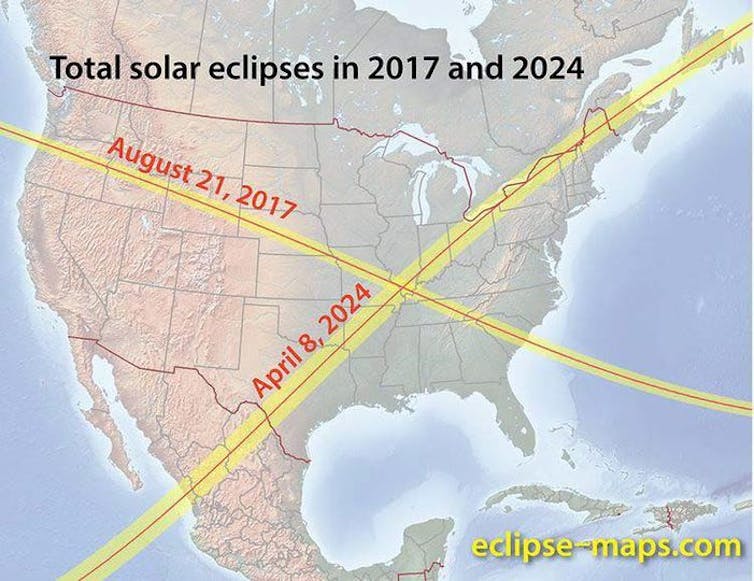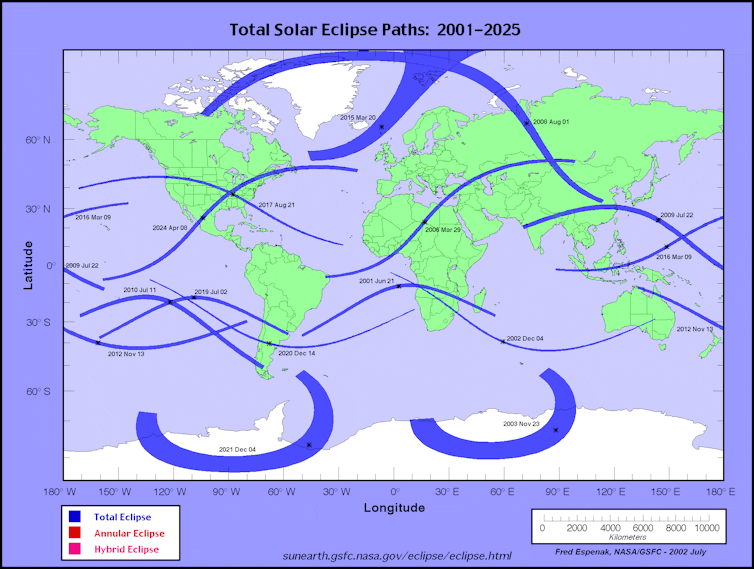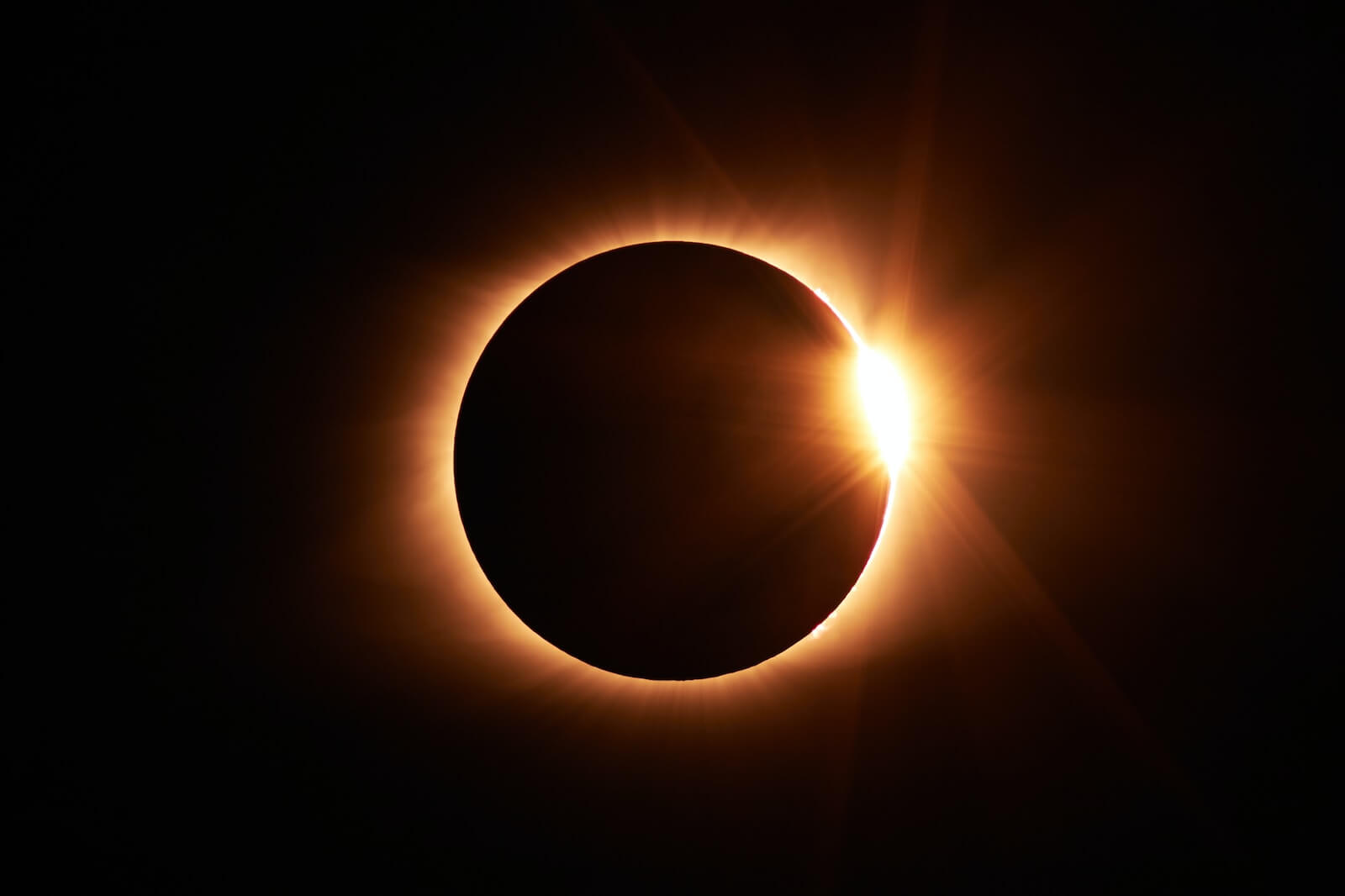Article written by Eric Vanden Eykel, Associate Professor of Religious Studies, Ferrum College
Does the upcoming solar eclipse signal the second coming of Jesus? In all likelihood, no, but that hasn’t stopped people from speculating that it does.
The New Testament is peppered with references to Jesus’ “second coming,” the time when Christians believe Jesus will return to Earth, the wicked will be judged, and the righteous rewarded. The Apostle Paul writes about it in his letters, and the Gospels portray Jesus speaking about it.
The upcoming solar eclipse on April 8, 2024, which will be visible over parts of North America, has brought with it a slew of predictions that Jesus might be returning sooner rather than later. I am a scholar of early Christian literature whose research focuses on how people read, understand and sometimes misunderstand biblical texts.
Religious theories surrounding this eclipse are part of a larger pattern of attempts to find meaning in astronomical events that goes back thousands of years.

Finding meaning in the skies
One of the more famous examples from the ancient world of people finding meaning in the skies occurred in 44 B.C.E., when a comet appeared in the skies over Italy just four short months after the assassination of Julius Caesar. Roman authors Pliny the Elder and Suetonius claimed that the comet was visible for about a week and that it was so bright, it could be spotted in the late afternoon.
Many Romans interpreted its appearance and lingering presence as a sign that Caesar had ascended to the heavens and had taken a seat among the many gods of Rome. Caesar’s deification was made official by a vote of the Roman senate less than two years later.
A few examples from the past 30 years further illustrate this phenomenon. In December 2020, speculation ran wild in some Christian circles that a planetary conjunction of Jupiter and Saturn signaled the return of the fabled “Star of Bethlehem” that led the wise men to the newborn Jesus.
For at least 10 years, televangelist John Hagee has promoted theories linking various “blood moons” as signs that the apocalypse is approaching.
A tragic example is the religious movement known as Heaven’s Gate. Members of this movement believed that there was a spacecraft hidden in the tail of the Hale-Bopp Comet, which appeared in 1997. This spacecraft, they thought, was coming to transport them to a higher level of consciousness. In March 1997, 39 members of the Heaven’s Gate movement committed ritualized, mass suicide through a lethal combination of phenobarbital, vodka and asphyxiation.
Chasing shadows
It can be difficult to pinpoint exactly where such interpretations of celestial events originate.
In the case of the upcoming eclipse, one of the images that has fueled predictions of Jesus’ second coming simply notes southern Illinois as the location where the upcoming eclipse will overlap the path of the last North American solar eclipse in 2017.

From this image, two theories have emerged: First, that these eclipses are separated by roughly seven years, which has symbolic significance in biblical literature as a number indicating completeness and perfection. Second, on charting the paths of these eclipses on a map, they appear to form a cross.
Some Christians have taken this as evidence that the upcoming eclipse is an indication that Jesus’ return is imminent.
But there is no logical basis for this theory.
For starters, solar eclipses are not quite as rare as they seem. A solar eclipse occurs when the moon passes between the Earth and the Sun and blots out all or some of the Sun’s light. They seem rare because they affect only the narrow strip of land that falls in the shadow of the Moon.
According to NASA, there has been an average of 2.5 eclipses per year over the past 1,000 years.
The phenomenon of two eclipses crossing paths is also rather unremarkable. Looking at a map of eclipse paths between 2001 and 2025, it is clear that eclipses frequently cross paths; of the 15 solar eclipses during this span of time, only two did not cross paths.

One could argue that the North American eclipses of 2017 and 2024 are unique because of the seven years that separate them. But this isn’t logical in terms of the larger argument that some are making. These eclipses – on August 21, 2017, and April 8, 2024 – are separated not by seven years but by six and a half years, or 2,422 days to be exact. Another pair of eclipses that crossed paths in the Pacific Ocean – on July 22, 2009, and March 9, 2016 – were separated by the same number of days.
Seek and you will find
Most of these end times predictions are rooted in North American evangelical views on the apocalypse, many of which originated or at least share an affinity with evangelical author Hal Lindsey’s popular book, “The Late Great Planet Earth.”
In this book, Lindsey predicted that the apocalypse would occur in the 1980s, and to make his argument, he stitched together a number of disparate events and phenomena to construct an apocalyptic narrative that included Soviet helicopters, the establishment of the state of Israel and nuclear warfare.
Lindsey was wrong, of course; the 1980s did not bring about the apocalypse. But this way of thinking – of seeking to find significance in various random events like eclipses – persists among some Christians.
The difference between this pairing of the 2017 and 2024 eclipses and the ones from 2009 and 2016 is simple: The most recent pairing crosses over the United States. Patterns emerge when and where they are sought, and much depends on the aims of the people doing the seeking.
The second coming of Jesus is undeniably a topic of conversation among New Testament authors. But it is interesting to note is that there is little agreement among these authors when it comes to timing. What is presented in the Gospels is different from what is presented in the letters of Paul. And both of these are quite different from what is found in the book of Revelation.
But these authors do share a sense that the timing of “the end” is ultimately mysterious and unknowable. And this would suggest that attempting to predict such timing by means of things like eclipses is, at the very least, not terribly “biblical.”![]()
This article is republished from The Conversation under a Creative Commons license. Read the original article.

Pre tribbers think the Lord Jesus is coming to whisk them away before the great tribulation. That’s what they have been taught, even though the Lord explicitly states in Matt 24 it will be after the tribulation. If this eclipse is a sign of anything, it is a sign that the tribulation is about to begin.
A “David” after my own heart…absolutely right….except for, I don’t believe this eclipse, even with ALL the many coincidences, which is SO amazing, it’s totally unreal. Mind numbing! Anyway, I don’t think this exclipse will start it.
Why?
Because…I’ve always believed that God wouldn’t leave us in the dark, or without telling us what sign He would give us, to show that the Tribulation has begun, and I for one, don’t see anything about an eclipse being what proceeds the Trib.
He did say of course, that the sun, moon, and stars, were for signs, and what these planetary objects would do, on that “Terrible Day of the Lord”, like the “stars falling from the sky”, or the “moon turning red”, etc etc.
Now, what do I believe proceeds the Tribulation? A peace treaty. And there’s much information I could give, to tell/show you, how close we are to that. With ALL the signs that have come up already, and THEY are totally mind numbing too! It would take too long on here to write it all out…again…on here, so one question for you..
Do you believe or think, or know if Trump is a Christian? Your answer would depend on whether I could tell you more on how and when the peace treaty comes about, between two certain countries…of which you probably already know those two I’m speaking of…I’ll wait to see if you write back interested in hearing my “theory” of which…again, I feel I was shown.
This is mysticism and it is relative to the observer (and only the observer). Eclipses have been happening for billions of years and it is simply the moon casting its shadow on the earth or vice-versa. I lived in England in 2000 and several churches in Lincolnshire were convinced the Lunar Eclipse on Jan 20 was the (pick one or both) return of Christ or the destruction of the earth. Neither happened. Every eclipse brings out those wanting to take advantage of others, to somehow validate their ideas (or pick up some money for their hustle). Because people tend remember the confirmation and not rejection of their interpretations of an event they somehow attribute it to their paradigm.
Sign seekers.
No, Christians don’t believe Jesus’ return is because of a solar eclipse. This story is only meant to make all Christians look insane or stupid. How about the other world religions? Is the author cool with what THEY have to say or, is Christianity the ONLY religion you question? Yeah, thought so.
Surely there must be ONE Christian who gets off on having their faith tested?